
EPCC, the supercomputing centre at the University of Edinburgh, has been designated an Intel Parallel Computing Center (IPCC) through a prestigious grant from Intel – a distinction currently held by only a handful of parallel computing centres worldwide.
Through this new partnership, EPCC will collaborate with Intel to optimise several open source high-performance computing (HPC) applications for Intel’s latest parallel processor architectures.
Incredible opportunity
Designation as an IPCC gives us an incredible opportunity to work on a range of important, and widely used, simulation codes to ensure that they can utilise the latest Intel hardware effectively. ARCHER, the UK’s national HPC service hosted and supported by EPCC is a Cray XC30 system with Intel® Xeon® Processor E5-2697 v2,” continued Mark. “It is therefore essential that mainstream simulation packages, which account for more than half the usage of ARCHER, are properly optimised to get maximum benefit from this technology. Prof. Mark Parsons, EPCC Executive Director (Research & Commercialisation).
“The centre will build on a range of world-class projects, collaborations, and initiatives that EPCC is currently involved with, including European HPC projects such as PRACE and CRESTA and global simulation initiatives, such as the G8-funded Nu-FuSE project,” said Adrian Jackson, Research Architect at EPCC and leader for EPCC’s involvement in NU-FuSE.
Dr Michèle Weiland, Project Manager at EPCC, said: “The initial target for optimisation and porting work are codes that EPCC is already very familiar with, have had experience parallelising and optimising for standard distributed memory parallel systems, and are used by a wide community of simulation scientists for world leading science on global challenges such as energy security, climate change, and future manufacturing technologies.”
"Intel is pleased to expand our Intel® Parallel Computing Center program in collaborating with EPCC," said Bob Burroughs, Director of Technical Computing Ecosystem Enabling at Intel. "This new centre creates an opportunity for Intel and EPCC to innovate and optimize applications which benefit industry and science in Europe and globally."
Performance tuning
EPCC’s Application Consultants, who are experts in the performance tuning of HPC modelling and simulation codes, will undertake the code porting and optimisation tasks. A further aim of the IPCC is to leverage the world-leading hardware available at EPCC, and its extensive training programmes, to provide training and expertise to a wider range of academic and industrial participants in the UK and Europe on efficiently using Intel hardware for computational simulation.
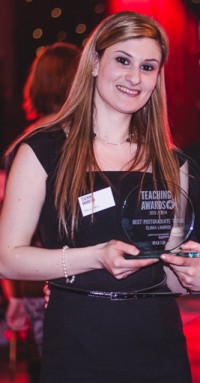
Congratulations to Eliana Lambrou, who has won the Best Postgraduate Tutor Award at EUSA's Teaching Awards. Charles Cockell was runner-up for the Van Heyningen Award for Teaching in Science and Engineering.
Best Postgraduate Tutor Award
This award recognises postgraduate tutors who:
• Stimulate interesting and engaging discussion in tutorials
• Make lab demonstrations fun
• Provide helpful feedback on students' work and are approachable with questions.
"The act I most admire her for was volunteering her own research time to tutor students in one-to-one sessions after class... She is a very modest woman and would not think she is worthy of this praise but her actions prove otherwise." Student nomination for Eliana Lambrou
Eliana Lambrou, who is based in the School's Particle Physics Theory group, said: 'I was delighted when I received the invitation for a fancy, black-tie event for the Teaching Awards, at which I was nominated for the Best Postgraduate Tutor Award. It is always good to see that your work is recognised by the students and I want to thank each of them for this acknowledgment. Their feedback on our teaching just makes us better!!!
'I want to thank my fellow tutors because of their big contribution in the effort to deliver good and useful tutorials, but mostly a big thank you goes to the organiser of the courses that I was tutoring, Kristel Torokoff, who has been a lovely teaching mentor and an inspiration to me.'
The Van Heyningen Award for Teaching in Science and Engineering
Charles Cockell, Professor of Astrobiology, was runner-up for this award. He said: 'I'm really delighted to be nominated by my students. Most importantly it shows an enthusiasm for the teaching of interdisciplinary science.'
"All of the students agree that he is not just an international superstar professor who has worked for NASA, he is also the best professor in general... when he delivered the last lecture in astrobiology dressed up as an alien, who had to feed every ten minutes, we could not help it: we were all in love with this amazing educator from another world!" Student nomination for Charles Cockell
Image gallery
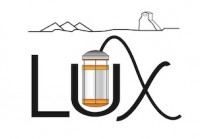
The LUX (Large Underground Xenon) dark matter experiment is seeking the first ever direct detection of dark matter.
LUX uses a 370kg liquid xenon time-projection chamber that aims to directly detect galactic dark matter in an underground laboratory 1 mile under the earth, in the Black Hills of South Dakota, USA.
The University of Edinburgh is a key member of this international project, and its effort is led by Dr Alex Murphy of the School's Nuclear Physics group. Dr James Dobson, a postdoctoral researcher in the Edinburgh team, is presently in charge of on-site operations of the project.
LUX has featured prominently in a series of recent BBC news features. Learn more about the project by following the links below.
Image gallery
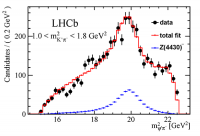
Edinburgh physicists, working on the LHCb experiment at CERN, have confirmed the existence of an exotic combination of four quarks/antiquarks that does not fit into the normal particle zoo of baryons and mesons.
A new measurement performed by the LHCb collaboration, one of the four large experiments at the LHC at CERN, has confirmed the existence of the exotic object labelled the Z(4430)-. This particle does not fit into the pattern of particles we have seen up to now. The LHCb result confirms an observation made by the Belle collaboration in 2008 that was later questioned and so resolves this previously unclear situation.
We and everything around us are made of atoms, and atoms are made in turn of smaller constituents. Atomic nuclei are orbited by electrons. The protons and neutrons that form atomic nuclei consist of three fundamental particles, called quarks, bound together. Other combinations of quarks can occur - particles containing two bound quarks (mesons) are also seen in nature. However, until now all particles containing quarks (hadrons) have conformed to one of these two types; quarks seem to like to come in twos or threes.
However, the underlying theory of quantum chromodynamics (QCD) that describes the behaviour of quarks allows for many different quark combinations, such as four quark states, to bind together into hadrons. Over the last forty years many searches for such exotic states have been performed but until now there was no conclusive proof of their existence. Several more mundane explanations for the Z(4430)- signal seen by Belle had been put forward, but the LHCb result establishes that for the first time we have seen the “smoking gun” signal for resonant behaviour of a particle contains at least four quarks/antiquarks.
The strange name, Z(4430)-, indicates that the particle has a mass of approximately 4430 MeV/c2, roughly four times heavier than a proton. In addition, the “-“ sign tells us that the state is negatively charged. The LHCb collaboration have also made a measurement of the spin and parity of this state, two fundamental properties (quantum numbers) that characterise its nature.
"This is a fantastic result from the LHCb collaboration. It confirms previous signs of this exotic state and shows, for the first time, that it has has the characteristic behaviour of a resonance. In addition we have also been able to pin down the quantum numbers and properties of this state with higher precision than previous experiments. The next step is to look for further signs of this state in the large sample of data that we have already collected."Greig Cowan, STFC Ernest Rutherford Fellow at the University of Edinburgh and one of the lead analysts on this result.
"This is tremendous result, demonstrating the existence of new exotic hadronic states and shows the power of the large dataset collected by LHCb to make new discoveries."Matthew Needham, Chancellor's Fellow at the University of Edinburgh, is the UK physics co-ordinator for the LHCb experiment.
Image gallery

The £43 million ARCHER (Academic Research Computing High End Resource) system will provide high performance computing support for research and industry projects in the UK.
ARCHER will help researchers carry out sophisticated, complex calculations in diverse areas such as simulating the Earth’s climate, calculating the airflow around aircraft, and designing novel materials.
Its magnitude and design will enable scientists to tackle problems on a scale that was previously thought impossible.
The system, at the University’s Advanced Computing Facility at Easter Bush, has up to three and a half times the speed of the HECTOR supercomputer system, which it replaces.
UK Research Data Facility
ARCHER’s twin rows of sleek black cabinets are supported by the newly-installed UK Research Data Facility.
The system brings together the UK’s most powerful computer with one of its largest data centres. This creates a facility to support Big Data applications, which has been identified by the UK Government as one of its Eight Great Technologies.
The building housing the ARCHER system is among the greenest computer centres in the world, with cooling costs of only eight pence for every pound spent on power.
“The University of Edinburgh has for many decades been a pioneer in High Performance Computing. Now that Big Data is reaching into an even greater range of areas we are delighted to have the ARCHER facility and its support at Edinburgh. Together with the UK Research Data Facility, we and the Research Councils have a facility unique in the UK, combining some of the world's most powerful computers with a vast datastore and analysis facilities. We will work with the Research Councils and UK researchers to generate world-leading research and business impact.” Prof Sir Timothy O’Shea, Principal of the University of Edinburgh
“ARCHER is the highest ranked UK supercomputer on the Top 500 list of November 2013. Based on Intel Xeon E5 v2 processors, the system is designed to deliver sustained performance and scalability, providing researchers and scientists with a powerful, reliable and productive tool.” Stephan Gillich, Director Technical Computing EMEA, Intel
ARCHER was supplied by US computing experts Cray and is funded and is owned by the Engineering and Physical Sciences Research Council (EPSRC). The Massively Parallel Processor uses Cray’s XC30 hardware. Intel’s Xeon E5-2600v2 processor series enables ground-breaking performance, scalability, and maximises energy efficiency.
Systems support for the machine will be provided by the University’s EPCC and Daresbury Laboratory. Science, user and engineering support will also be provided by EPCC.
ARCHER for industry
EPCC's Accelerator programme gives industry on-demand access to the ARCHER supercomputing service.
Image gallery
Astrophysics undergraduate Victoria Weller von Ahlefeld is a co-author of a paper about Gamma-Ray Bursts that was published in the American Journal for Astrophysics this month. She undertook the work at the Max-Planck Institute for Extraterrestrial Physics after the second year of her degree here in the School.
Victoria explains the background to the paper.
Detecting Gamma-Ray Bursts
Gamma Rays are at the most energetic end of the electromagnetic spectrum, allowing them to travel into the depths of the Cosmos. Therefore, Gamma-Ray Bursts (GRBs) can reach Earth from very distant objects, allowing insight into primordial conditions of the Universe. Possible sources of such energy blasts are supernovae, hypernovae or binary neutron star systems, although there is little which is really known about them.
The space telescope Fermi has been in orbit detecting GRBs with the Gamma-ray Burst Monitor (GBM) device since June 2008 and has been triggered on over 900 occasions since. A large volume of data must be analyzed and put into a useful format: the spectral catalog. Spectra extracted from 462 GRBs in years 3 and 4 of the mission supplemented the data from the first two years.
My internship was with the High-Energy Astrophysics group at the Max-Planck Institute for Extraterrestrial Physics during the time when the peak of data analysis was carried out. I was working with David Gruber, a brilliant PhD student in charge of producing a spectral catalog.
Via the IDL (Interactive Data Language) data visualization and analysis platform, 462 GRBs underwent proper readout and visualization. The GBM on Fermi has 14 detectors, of which the best exposed must be selected. After determining the duration of all observed bursts, polynomial background needed to be fitted across a user-defined interval to all suitable detectors. Furthermore, reduced data was used to perform the spectral analysis using four different spectral models, therefore obtaining a compendium of over 3700 GRB spectra.
The Fermi GBM Gamma-Ray Burst Spectral Catalog: Four Years of Data was published in The Astrophysical Journal Supplement Series in March 2014. Following Victoria's work on the data analysis part of the production of the catalog, her name is the third of 32 authors of the paper.

Our MSc in High Performance Computing is taught by EPCC, a research institute within the University of Edinburgh.
EPCC is one of the leading centres of supercomputing expertise in Europe, and it manages an extensive collection of HPC systems including the UK’s national supercomputer ARCHER, a 72,000-processor Cray XC30 system. Our MSc students have access to supercomputer facility like ARCHER and use them extensively for practical exercises and project work.
High Performance Computing is widely used in science, engineering and industry. Many branches of modern science, such as climate research and nanotechnology, rely on complex computer models, which can only be run on parallel supercomputers.
Companies involved in areas such as aerospace and automotive engineering, oil exploration, drug design and genetic sequencing all run computer models on HPC systems. Furthermore, the parallel programming techniques that were once only applicable to specialist machines are now essential for any software developer who wants to take full advantage of modern multicore processors, graphics processors and computing clusters.
Virtual open days
If you are interested in applying for the MSc in HPC, the virtual open days are a great way to find out more about it.
Upcoming virtual open days in 2014
- Tuesday 11 March 13:00 – 14:00 GMT
- Tuesday 22 April 12:00 – 13:00 BST
- Tuesday 27 May 13:00 – 14:00 BST
These sessions are hosted by the Programme Director, Dr David Henty. Presentations are followed by a Question & Answer session. The presentations will cover an introduction of the MSc programme, course contents, career opportunities, scholarships, applying and other aspects of studying with us.
Registration
Register your place by emailing msc [at] epcc.ed.ac.uk with your name and the virtual open day session of your choice.
Scholarships
A number of scholarships are available for MSc in HPC applicants for academic year 2014/15. Please visit the MSc in HPC programme website for details.
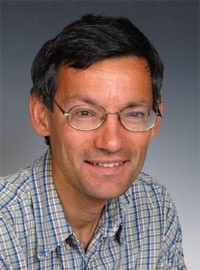
Prof. Graeme Ackland, of the School's Institute for Condensed Matter & Complex Systems, is to receive the Royal Society Wolfson Research Merit Award, which recognises outstanding scientists working in the UK.
Prof. Ackland's research is in applying quantum mechanics to the structure of materials. This requires not just being able to do quantum mechanics, but to be able to understand it well enough to extract the essential physics without calculating too many less relevant details.
The award recognises his work in making simplifying approximations to the quantum mechanical description of materials. This enables him, and other groups, to carry out simulations using millions of atoms, rather than the hundreds which are possible with the exact treatment. In most practical applications, the advantages of the full quantum treatment are negated by prosaic difficulties arising from finite size effects.The award recognises Prof. Ackland's definitive model for iron, applications in radiation damage, and supports future development of simple models for metal-oxide interfacial binding.
"This is a great honour. Well done, Graeme!"
Prof. Arthur Trew, Head of the School of Physics & Astronomy
This video gives a short summary of the research: http://www.nutshell-videos.ed.ac.uk/graeme-ackland-self-healing-materials/
About the Royal Society Wolfson Research Merit Award
This scheme is for outstanding scientists who would benefit from a five-year salary enhancement to help recruit them to or retain them in the UK. Sir Isaac Wolfson FRS (1897-1991) was a businessman who distributed most of his fortune to good causes. The scheme provides universities with additional support to enable them to recruit or retain respected scientists of outstanding achievement and potential to the UK. It provides a salary enhancement which is paid by the university in addition to the basic salary. The scheme covers all areas of the life and physical sciences, including engineering, but excluding clinical medicine. The scheme is jointly funded by the Wolfson Foundation and the Royal Society.
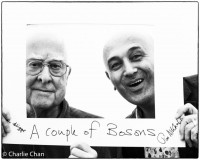
Prof. Peter Higgs was interviewed by Jim Al-Khalili on his way to Nobel Week in Stockholm. The resulting programme is the first in the new series of BBC Radio 4's “The Life Scientific”, which will be aired at 9am on BBC Radio 4 on 18th February, 2014.
The interview will be available here after it has been broadcast: https://www.bbc.co.uk/programmes/b03vdx7m
You can read more on Jim Al-Khalili's blog.
Image gallery
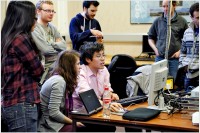
Innovative Learning Week (ILW) 2014 is a week-long programme of exciting and creative events that brings together staff, students and alumni from across the University.
The School of Physics & Astronomy will be offering the following events:
Tuesday 18th
Team Review Presentations
9-5:30pm Room 5215 JCMB. Open to ALL students and staff
SCART Connection: “What is Beauty to a Physicist and Truth to a Silversmith?”
10-12pm, Summerhall. Open to ALL students
Sign up at http://scart.eventbrite.co.uk
Wednesday 19th
Group Project Presentations
9-5:30pm, Room 6301 JCMB. Open to ALL students and staff
Thursday 20th
“Key Basics for Getting Started with LaTeX”
- Introductory Presentation
- Short break for refreshments and doughnuts
- Practical Session with the opportunity to ask questions
11-1pm, Ground floor CP Lab JCMB. Open to ALL students
MUST have Physics CP lab access/login
Orienteering around KB
Prizes for 1st and 2nd place finishes!
3pm starting from JCMB front doors. Open to ALL students
“Weird new worlds around other stars”
ILW Keynote Seminar will be given by Dr Ken Rice and Dr Beth Biller, School of Physics & Astronomy, on the topic of exo-planets, or planets outside our solar system, and the search for potentially inhabitable planets orbiting distance stars. This is particularly topical with the recent discovery of Kepler-78b.
Drinks Reception from 5pm. Keynote Seminar 6-7pm, Lecture Theatre A, JCMB
Open to ALL students and staff of the School of Physics & Astronomy

